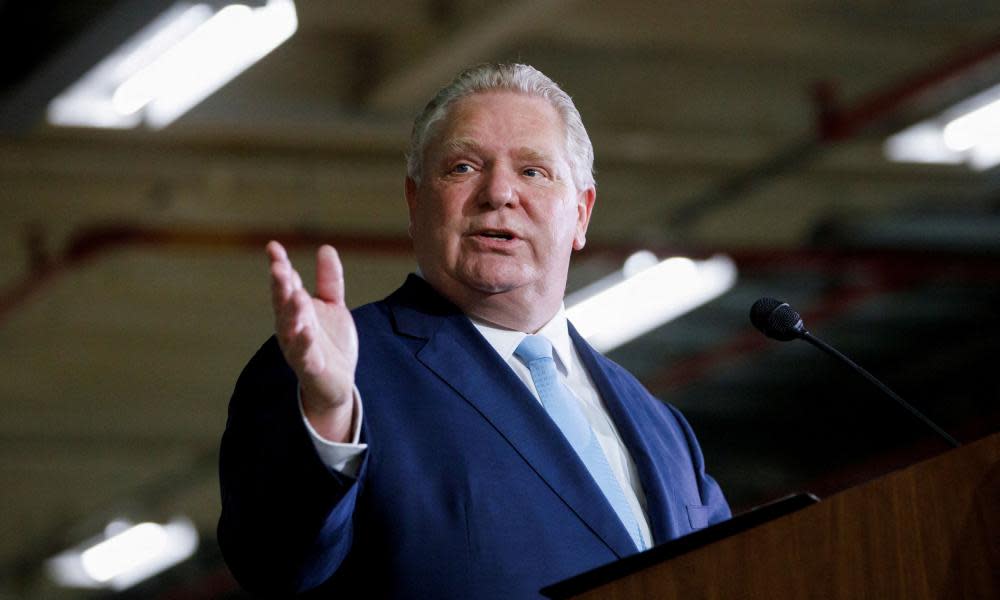Canadian bill would fine workers $4,000 for each day they strike

The premier of Canada’s most populous province is under fire for a “draconian” bill that would fine school support staff C$4,000 a day for striking, prompting concerns that Ontario is eroding fundamental workers’ rights – and setting a troubling precedent.
Doug Ford’s conservative government tabled legislation this week that would unilaterally impose a contract on education workers, and levy hefty fines for striking. The move escalates a bitter dispute over pay for education workers, including custodians, early childhood educators and educational assistants.
Prime minister Justin Trudeau has waded into the standoff, sharply criticizing the Ontario government decision to “suspend people’s rights and freedoms”.
The Canadian Union of Public Employees, which represents 55,000 education workers, has called for an 11.3% raise for its workers – often the lowest paid in schools – arguing that stagnant wage growth and high inflation have hit the lowest earners hardest.
The government has countered with a 2.5% annual raise for the lowest income workers and 1.5% raises for others.
With little progress on negotiations and a strike planned on Friday, the government fast-tracked Bill 28.
If passed, the controversial legislation – which fines workers C$4,000 a day and the union C$500,000 for striking – would mark the first time in the county’s history that the right of workers to collectively bargain and to strike could be legally stripped away.
The government acknowledges its bill breaches the country’s Charter of Rights and Freedom and the Human Rights Code, but says its priority is averting a strike.
Ontario’s government is invoking a rarely used legal mechanism known as the notwithstanding clause which allows provincial governments to override certain portions of the charter for a five-year time period – but requires they must be “demonstrably justified in a free and democratic society”.
Quebec has long used the clause to pass its language rights laws, but most governments have been hesitant to use the mechanism, said constitutional lawyer Ewa Krajewska.
“The Ford government has been much quicker to reach for the clause and the worry from a constitutional rights perspective is that it’s becoming increasingly normalized to invoke it,” she said. “And I’m concerned that every time there’s a bit of a blow up about rights and legislation, the government is just going to invoke the notwithstanding clause. The fact that they’re willing to go to it so quickly should give everyone pause.”
Canada’s justice minister called it “exceedingly problematic”, but Krajewska says there is little the federal government can do to stop it.
Lawyers say they are also troubled by the government’s pre-emptive use of the clause which would shield Bill 28 from judicial review.
“The Ford government is essentially saying it is above the law. This is not just an attack on the fundamental charter rights, human rights and labor rights of education workers. It’s also an attack on our constitutional democracy and the rule of law,” said Adrienne Telford, a constitutional and labour lawyer.
Canada’s top court recognised workers’ right to strike in 2015. In cases where employees are deemed essential, the right to strike is replaced by arbitration.
Telford said that Ontario’s attempt to unilaterally impose a contract and working conditions was even more worrying.
“Workers weren’t even allowed to exercise their right to strike. It’s preemptively taken that away. But what’s even more shocking is that the government isn’t replacing their fundamental right to strike with the right to arbitration,” she said. “Basically, this is an attempt by the government to avoid having to appear before an independent arbitrator and not get what it wants.”
Ford has long styled himself as a champion of the working class, but the row has prompted one union that previously endorsed him to call for the premier to reverse course.
Earlier this week, a branch of Labourers’ International Union North America, Canada’s largest construction union, lobbied the province’s education minister to restore collective bargaining rights.
The Ontario Bar Association also condemned the move, calling the uncertainty surrounding fundamental rights “potentially destabilizing” and prompting fears the short term gains won by Ford’s government could come at a cost to society “that might not be recognised until it’s too late”.
“In theory, governments could just include the notwithstanding clause in every piece of legislation that they have,” said Telford. “What is the point of fundamental rights and freedoms if they can just be preemptively and overridden – and shielded from review by a court?”

 Yahoo News
Yahoo News 
